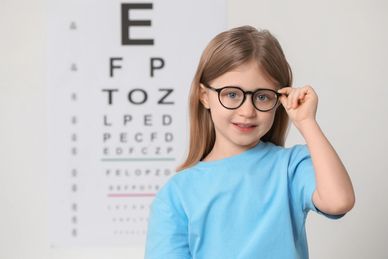Our Services
Comprehensive Eye Exams
Comprehensive Eye Exams
Annual eye exams are very important not only to determine if you need glasses or contact lenses, but to also maintain the health of your eyes. A complete eye exam typically takes 20 to 30 minutes and consists of a series of tests to evaluate your vision and to check for any ocular health concerns. With regular eye exams the doctor can sometimes detect a problem before any noticeable symptoms begin to occur.
Contact Lenses
Comprehensive Eye Exams
A thorough evaluation and fitting is needed to ensure a proper and healthy contact lens fit. A contact lens is a medical device and should be handled with care. Our doctors have experience fitting many different types of soft contact lenses, including spherical, astigmatism, multifocal, or monovision contact lenses, with most trials available to try the same day as your exam.
Myopia Management

We are proud to offer myopia management options with MiSight® contact lenses and Stellest® spectacle lenses. These methods are scientifically proven to slow the progression of nearsightedness in children ages 6-12. Our goal is to protect your child’s vision, support healthy eye development, and reduce their long-term risk of eye disease.
Retinal Imaging
Cataract Evaluation
Our doctors recommend that all patients have a thorough examination of their retina every year. We are excited to offer the state-of-the-art Eidon digital retinal scanning technology that allows our doctors to view the inside of your eye without the use of dilation drops. The unique Eidon ultra-widefield view helps our eye care practitioners detect early signs of retinal disease more effectively and efficiently than with traditional eye exams.
Cataract Evaluation
Cataract Evaluation
Cataract Evaluation
A cataract is a clouding of the lens of the eye, which is located behind the colored iris, and is normally transparent. The cataract blocks or changes the amount of light going into the eye, and can cause issues such as decreased vision, dimmer colors, headlight glare or halos at night and difficulty doing fine hand work. There are no diets, drugs or eye drops that have been proven to make cataracts go away, the only option is surgical removal.
Red Eye Evaluation
Cataract Evaluation
Cataract Evaluation
Did you know your optometrist can help you with your red eye symptoms or eye emergencies? Our doctors are licensed to prescribe both topical and oral medications to treat eye conditions and diseases like:
- Sore, red, or itchy eyes
- Treatment of "pink eye" and other infections
- Removal of foreign bodies (such as wood or metal)
- Corneal abrasions
- Eye allergies
- Swollen or tender eyelids
